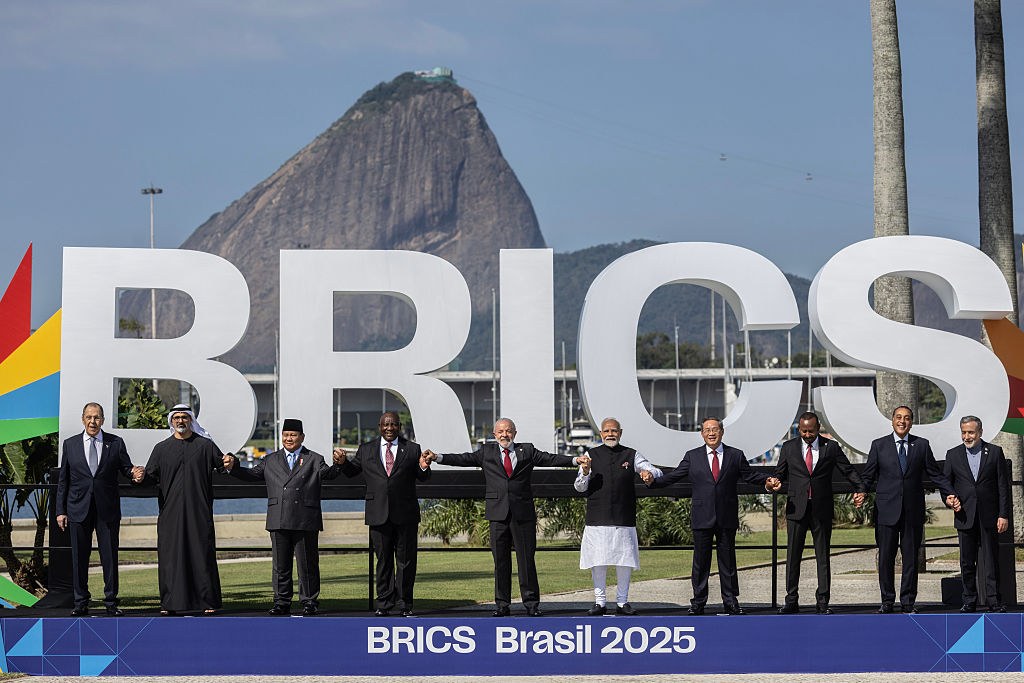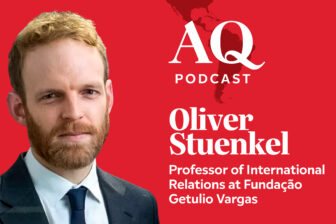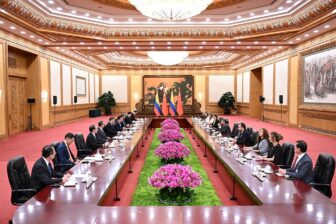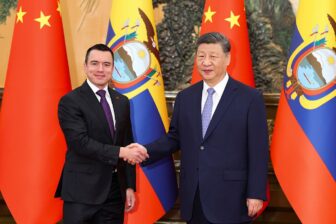BEIJING— The 17th BRICS Summit, held in Rio de Janeiro earlier this month, highlighted a central paradox of global politics: A bloc frequently dismissed as incoherent and ineffective provoked an immediate economic response from the world’s most powerful country.
Triggered by BRICS proposals to bypass U.S. dollar-based systems, expand cooperation frameworks, and launch a new multilateral guarantee fund, President Trump announced 10% tariffs on nations he claimed engaged in “anti-American policies.” Days later, he escalated the confrontation by imposing a sweeping 50% tariff on all Brazilian imports. The added tariffs were not a direct consequence of the animosity with BRICS — they were imposed, according to the U.S. government, due to supposed political persecution of former President Jair Bolsonaro, a Trump ally, and alleged “unfair trade” practices.
Trump then mocked BRICS as a “little group fading out fast,” and warned it would “end very quickly if they ever formed in a meaningful way.” The president also claimed that losing the dollar’s global reserve status would be equivalent to “losing a world war,” and pledged that the U.S. would not allow that to happen “under any circumstances.”
These statements, paired with the threat of economic retaliation, undermine the claim that BRICS is irrelevant or symbolic. Instead, they confirm the bloc’s growing ability to unsettle established powers. The delegitimization of BRICS is a deliberate discursive strategy aimed at containing alternative power centers before they fully consolidate their influence.
This strategy may backfire, ultimately strengthening ties within BRICS. In a July 27 interview with the Financial Times, President Luiz Inácio Lula da Silva’s top foreign policy adviser Celso Amorim stated that Trump’s attacks “are reinforcing our relations with the BRICS, because we want to have diversified relations and not depend on any one country.”
BRICS is routinely criticized for lacking shared objectives, suffering from internal asymmetries (especially China’s dominance), failing to produce transformative results, and lacking the institutional depth of Western organizations. A more politically charged narrative often emerges, portraying BRICS not only as institutionally weak but also as ideologically hostile. Accusations that the bloc is “anti-Western” transform legitimate critiques of global governance into threats against liberal-democratic values, turning dissent into antagonism against an increasingly assertive Global South.
A new political arena
After the Rio summit, Brazil released a joint declaration outlining a roadmap for a cross-border payment system aimed at reducing dependency on the U.S. dollar, and the bloc laid the groundwork for “BRICS Pay,” a shared financial infrastructure. Climate also featured prominently in the summit’s joint declaration, in which it called on wealthier nations to finance mitigation efforts and supported Brazil’s “Tropical Forests Forever” initiative, which includes China and the UAE as potential funders. The bloc also rejected protectionist measures such as the EU’s carbon border tax, framing them as barriers to equitable energy transitions.
Perhaps the most tangible development was the launch of a Multilateral Guarantee Fund through the New Development Bank, modeled on the World Bank’s MIGA. This mechanism aims to mitigate investment risk and catalyze private capital for infrastructure and climate-related projects, particularly in the Global South. In a decisive rhetorical move, President Lula positioned BRICS as the “heir to the Non-Aligned Movement,” suggesting that BRICS represents a “third way” in contemporary geopolitics.
Still, the path from vision to implementation will not be linear. Institutional asymmetries among BRICS members—including differences in regulatory frameworks, macroeconomic priorities, and technological capacity—present real coordination challenges. Efforts like BRICS Pay or the Multilateral Guarantee Fund will require political will, technical harmonization, and sustained financial commitment. Moreover, the dominance of legacy institutions such as the IMF and World Bank, along with the entrenched role of the U.S. dollar in global trade, cannot be easily displaced.
Yet to measure success solely by immediate operational outcomes would be to misunderstand the nature of power in global governance. The capacity to shift narratives, shape expectations, and force strategic reactions is itself a form of influence.
BRICS has recently expanded to include Indonesia, Egypt, Ethiopia, Iran and the UAE, and more than 30 other nations have expressed interest in joining, reflecting its growing diplomatic appeal.
This suggests that BRICS is emerging as a political arena where alternative norms, priorities and coalitions are incubated. That signals a redistribution of soft power, one that is already unsettling for established powers and increasingly resonant among states seeking greater autonomy in a multipolar world.
Preemptive containment
By framing BRICS as inherently anti-Western before it gains institutional traction, Western powers seek to suppress viable alternatives during a period of vulnerability in the liberal order. The intent is not to debate performance, but to shape perceptions.
These critiques expose contradictions within Western institutions such as the G7 and the IMF, among others. For example, the West’s strategic partnerships with autocratic regimes like Saudi Arabia are rarely viewed as moral compromises, whereas BRICS’ political diversity is framed as disqualifying.
In development finance, the G7 champions global equity but blocks IMF reforms that would empower emerging economies. When BRICS created the New Development Bank to fill this gap, it was dismissed as symbolically insufficient. Even internal dissent is judged unevenly. Divergences within the G7 are often described as a measure of democratic vitality and plurality, whereas they are interpreted as institutional failures when they occur within BRICS.
By contrast, similar inconsistencies within BRICS—differing positions on major global conflicts, uneven commitments to multilateral reform, competing regional leadership ambitions, or lack of alignment on core principles—become grounds for delegitimization. These are real challenges, but so are the ones facing Western democracies.
Europe has expressed clear reservations about the BRICS project, particularly in response to initiatives like BRICS Pay and the creation of alternative financial architectures. Many EU observers interpret BRICS+ as a geopolitical move led by China and Russia to reshape global governance around a Sino-Russian axis, challenging Western-centered multilateral institutions.
Concerns over normative divergence and strategic misalignment have intensified, with the European Union itself facing internal criticism for treating emerging economies as students rather than equal partners. While BRICS seeks to reduce dependence on the dollar and build new forms of cooperation, European critics fear these efforts could erode the institutional and normative frameworks—such as transparency, governance standards, and human rights—through which the West continues to assert moral leadership.
Reframing legitimacy in the global order
BRICS’ legitimacy does not derive from institutional mimicry, but from its demographic and economic weight. Representing almost half the world’s population and accounting for around 27% of global GDP, the bloc’s authority stems from its relevance, not from historical privilege. Although its lack of a permanent secretariat or constitutional treaty is often portrayed as a liability, in practice it might be better suited for the fluid dynamics of the current geopolitical landscape.
Delegitimizing BRICS serves to protect historical privilege by restricting which models of cooperation are viewed as credible. But Rio 2025 proved that alternative arrangements are not only possible, they’re already underway. As the Global South becomes more assertive, the real contest is no longer between institutional performance and competing visions of international order, but between two competing visions: one rooted in privilege and the other in contemporary representation.
Shifting global dynamics demand that observers and policymakers abandon the assumption that legitimacy is fixed and begin to recognize it as something constructed, contested, dynamic and increasingly multipolar. The BRICS group has many problems, after all, who doesn’t in this complex and changing world? But one thing is clear: they are not waiting for permission to matter.









